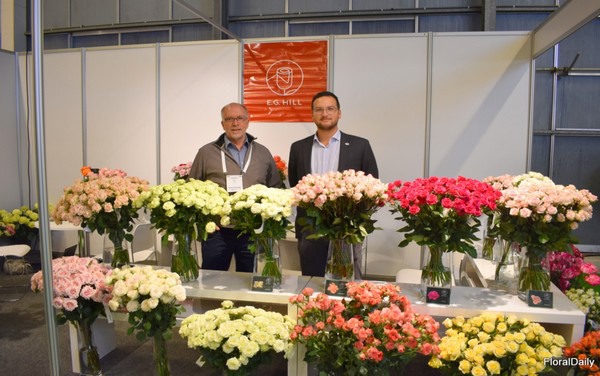The 140-year-old rose breeding company made the decision 6 years ago to relocate their breeding from the US to Ecuador. “It made the selection process much more efficient and precise, and we have seen very positive results from our customers,” explains Dean Rule, Representative of E.G. Hill. In addition, the company has opened a tissue culture lab in order to speed up the multiplication process and provide clean materials for their high demand. Dean also explains that being located right on the equator has some benefits for their business as well.
Dean Rule (left) at the E.G. Hill stand at the IFTF 2021
A relocation
The E.G. Hill company started in the US in 1881. Only six years ago, they made the decision to move their breeding to Ecuador. “This is a very important market for our company. Therefore, we felt that it would be beneficial to make a change, as we were doing our breeding in a climate that is totally different from the climate where our main customers are located. As a result, the selection process was much less efficient, because you are trying to guess what would happen when you bring them to Ecuador. Often when you bring a variety from North America or Europe to Ecuador or other producers around the equator, you tend to get a bigger head because of a longer cycle and a shorter stem because of better light conditions.”
Hill explains that they had three objectives when it came to this relocation:
1. Being more precise in their selection process.
2. Being more environmentally friendly: “We don’t have heated greenhouses nor do our customers, so our carbon footprint is much lower.”
3. Because they are doing the breeding in Ecuador, they do not have the same double selection process, which shortens the time from making the crossing to bringing it to market.
What are the results?
According to Dean, the results of the relocation have already been very positive. “We are seeing from the selection of our customers that there is an explosion of new introductions. Around 30 new varieties have already been selected by our customers to start growing. All of this has been a major transformation for our 140-year-old company, but we are very happy with the turnout.”
A new tissue culture lab
At the moment, one of E.G. Hill’s biggest challenges is the time that it takes to multiply the varieties. “It all starts with one seed, one plant, and then they have to get multiplied by cloning. When you have a lot of new varieties, it takes a lot of time. Therefore, we opened a new tissue culture laboratory to speed up the process. This way, we will be able to provide more, and clean, materials for our customers.”
The tissue culture lab is not just used for roses. “We are also using it for a project where the crops will be produced by indigenous groups of the Amazon River basin so that they can have a liveable income. We are also using it to recover some of the native species that have historically grown here, such as native potatoes.”
Latitude and longitude
Dean also explains that their location is beneficial for them. “Latitude determines the constancy of the environment. The closer you move to the equator, the more constant the temperature is. Therefore, if you want to grow a crop year-round and have it be uniform, such as with roses, the closer you are to the equator, the better you can do that without environmental modifications. Our laboratory and office are in the Southern hemisphere and our breeding and showroom are in the Northern hemisphere within the same farm. This location is thus very beneficial for rose production.
“Longitude, on the other hand, determines your natural market. One of the things we see in Ecuador is that more and more of the market is headed towards the US and Canada. This makes sense, as it is the natural market they align with,” Dean adds.
For more information:
E.G. Hill
www.eghillcompany.com
